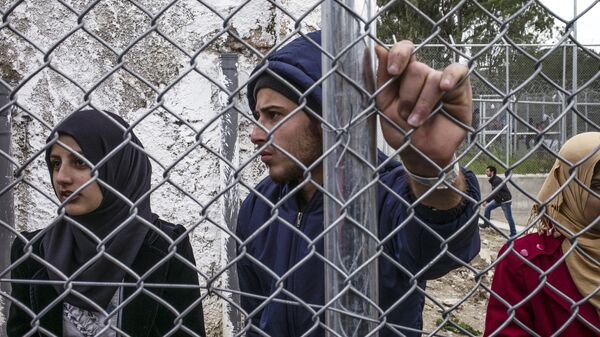On 18 March 2016, Ankara and Brussels agreed a policy in which so-called irregular migrants would be sent back from Greece to Turkey in return for specially selected Syrian refugees housed in Turkish refugee camps to be resettled in Europe.
Two years later and around 10,000 asylum seekers remain stuck in government run facilities on Greek islands, unable to leave due to restrictions imposed on them by a deal made between the European Union and Turkey.
READ MORE: Not My Problem: UK 'Turns a Blind Eye' to Europe's Migrant Crisis
The deal became known as the 'one-for-one' policy and the European Union was accused of "outsourcing the refugee crisis to Turkey" by the European Parliament Foreign Affairs Committee which said the deal was "not a credible long-term solution to the problem."
I want to come back to lesvos#Moria pic.twitter.com/wetb117Pm8
— arash hampay (@AHampay) March 16, 2018
On the second anniversary of the migration deal, human rights organization Amnesty International (AI) is calling once again for it to end. "The EU-Turkey deal perfectly encapsulates Europe's current migration policy of 'out of sight out of mind'," Irem Arf, AI's Migration Researcher said in a statement.
"The deal is keeping thousands of people in squalid conditions on Greek islands with the aim of returning them to Turkey. No longer at their doorsteps, the dire situation of these people is conveniently ignored by European leaders celebrating the deal as a success.
People are living in fear and destitution on the Greek islands, two years after the #EUTurkeyDeal came into force.
— Amnesty EU (@AmnestyEU) March 19, 2018
More #EU solidarity is the key to a sustainable solution.@irem_arf to #OpenTheIslands after her recent visit. https://t.co/EYdEidAjuy pic.twitter.com/DbDhJYAT85
READ MORE: Europe One Year On: A Million Migrants, a Million Lives, Still no Solution
But by the end of 2017, families trapped on the Greek islands were said to be "on the brink of a humanitarian crisis." MSF (Doctors Without Borders) called upon the EU and Greek authorities to allow migrants to move to the mainland. Around 7,000 people were living in a makeshift camp on Moria built for 2,300 people.
The deal may have led to a drop in the number of new migrants arriving on Greek shores, but it has led to thousands of refugees forced to resort to unsafe routes operated by people smugglers, the very business model the EU-Turkey deal aimed to disrupt.
"Building visible or invisible walls will not stop people trying to restart their lives in safety", Irem Arf said in a statement. "European leaders must keep their promises and bring refugees in from Turkey and frontline EU member states, Greece and Italy," Arf said.
There are currently around 13,000 men, women and children living on the islands of Lesvos, Chios and Samos in overcrowded camps and sleeping in unsuitable tents.
#Refugees on #greek islands on 23/2/2018#lesvos: 6907#chios: 1534#samos: 2455#kos: 959#leros: 681
— Advocates Abroad (@AdvocatesAbroad) February 26, 2018
other… https://t.co/WuAi0UBcRF
MSF says the two year old deal continues to fail thousands of people seeking asylum, calling it a "historical failure". "Two years ago, the European Union and its member states decided to historically fail thousands of people and to compromise the very concept of asylum by agreeing to return to Turkey asylum seekers seeking safety in Europe," Louise Roland Gosselin, head of Mission Greece for MSF said in a statement.
Two years ago
— MSF International (@MSF) March 18, 2018
Yesterday
Today
and every day
We will continue to firmly oppose the #EUTurkeydeal. We will not stop demanding an end to this cynical strategy of containment, to stop further damaging the health of our patients & to respect their dignity. https://t.co/t2Pidwz65L
"Since then our medical teams in Greece have witnessed an endless stream of misery and desperation from the thousands of men, women and children who continue to arrive on Greek shores and are trapped on the Greek islands. It's them who pay the real cost of this dirty deal," Gosselin adds.
The #refugeedeal is now in jeopardy. While #Turkey holds his words in this deal, other countries do not hold their words.
— İskender Karakaya (@iskarakaya) April 25, 2017
Meanwhile Turkey has repeatedly threatened to thwart the deal because the lifting of visa rules on Turkish citizens visiting the EU has not been implemented and the money promised by the EU has not yet materialized.
READ MORE: 'Hungary Will Not Become an Immigrant Country' — PM Viktor Orban
The EU pledged US$ 7.3 billion in financial aid to Turkey to pay for projects helping Syrian refugees. The EU Commission says it has paid US$ 3.68 billion through projects and says it will make the second tranche available. However the Turkish government claims it has only received US$2.21 billion from the EU.
READ MORE: Number of Asylum Seekers in EU Down by Almost Half in 2017- Reports


